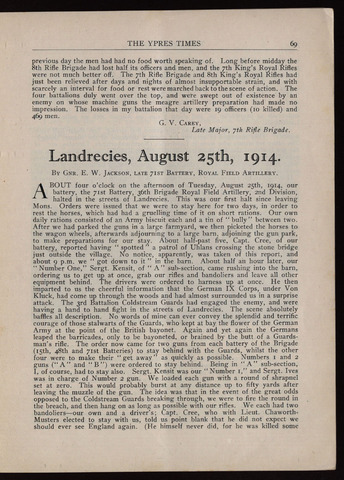LaedrecieSj August 25 th, 1914.
THE YPRES TIMES
69
previous day the men had had no food worth speaking of. Long before midday the
8th Rifle Brigade had lost half its officers and men, and the 7th King's Royal Rifles
were not much better off. The 7th Rifle Brigade and 8th King's Royal Rifles had
just been relieved after days and nights of almost insupportable strain, and with
scarcely an interval for food or rest were marched back to the scene of action. The
four battalions duly went over the top, and were swept out of existence by an
enemy on whose machine guns the meagre artillery preparation had made no
impression. The losses in my battalion that day were 19 officers (10 killed) and
469 men.
G. V. Carey,
Late Major, yth Rifle Brigade.
By Gnr. E. W. Jackson, late 71ST Battery, Royal Field Artillery.
ABOUT four o'clock on the afternoon of Tuesday, August 25th, 1914, our
battery, the 71st Battery, 36th Brigade Royal Field Artillery, 2nd Division,
halted in the streets of Landrecies. This was our first halt since leaving
Mons. Orders were issued that we were to stay here for two days, in order to
rest the horses, which had had a gruelling time of it on short rations. Our own
daily rations consisted of an Army biscuit each and a tin of bully" between two.
After we had parked the guns in a large farmyard, we then picketed the horses to
the wagon wheels, afterwards adjourning to a large barn, adjoining the gun park,
to make preparations for our stay. About half-past five, Capt. Cree, of our
battery, reported having spotted a patrol of Uhlans crossing the stone bridge
just outside the village. No notice, apparently, was taken of this report, and
about 9 p.m. we got down to it in the barn. About half an hour later, our
"Number One," Sergt. Kensit, of A" sub-section, came rushing into the barn,
ordering us to get up at once, grab our rifles and bandoliers and leave all other
equipment behind. The drivers were ordered to harness up at once. He then
imparted to us the cheerful information that the German IX Corps, under Von
Kluck, had come up through the woods and had almost surrounded us in a surprise
attack. The 3rd Battalion Coldstream Guards had engaged the enemy, and were
having a hand to hand fight in the streets of Landrecies. The scene absolutely
baffles all description. No words of mine can ever convey the splendid and terrific
courage of those stalwarts of the Guards, who kept at bay the flower of the German
Army at the point of the British bayonet. Again and yet again the Germans
leaped the barricades, only to be bayoneted, or brained by the butt of a Guards
man's rifle. The order now came for two guns from each battery of the Brigade
(15th, 48th and 71st Batteries) to stay behind with the Guards, whilst the other
four were to make their "get away" as quickly as possible. Numbers 1 and 2
guns ("A" and B were ordered to stay behind. Being in "A" sub-section,
I, of course, had to stay also. Sergt. Kensit was our Number 1," and Sergt. Ives
was in charge of Number 2 gun. We loaded each gun with a round of shrapnel
set at zero. This would probably burst at any distance up to fifty yards after
leaving the muzzle of the gun. The idea was that in the event of the great odds
opposed to the Coldstream Guards breaking through, we were to fire the round in
the breach, and then hang on as long as possible with our rifles. We each had two
bandoliersour own and a driver's; Capt. Cree, who with Lieut. Chaworth-
Musters elected to stay with us, told us point blank that he did not expect we
should ever see England again. (He himself never did, for he was killed some

